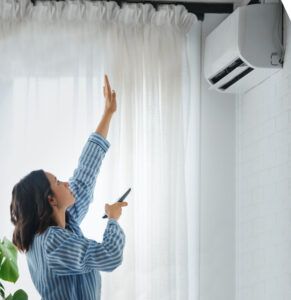
In Florida’s climate, maintaining optimal indoor air quality (IAQ) is essential for comfort and health. An often-overlooked factor in improving IAQ is upgrading your air conditioning (AC) system. While many homeowners focus on energy efficiency and cooling performance, replacing an outdated or inefficient AC unit can significantly enhance the quality of the air in your home. Here’s how a new AC system can positively impact your indoor environment.
Advanced Filtration Technologies
Modern AC systems come equipped with advanced filtration technologies that can significantly improve air quality. High-efficiency filters in new units are designed to capture smaller particles, including dust, pollen, pet dander, and even some bacteria and viruses. These improved filters help to reduce allergens and contaminants circulating in your home, leading to cleaner, healthier air.
Better Humidity Control
Excess humidity can contribute to poor indoor air quality by promoting mold growth and creating an environment for dust mites and other allergens. Newer AC systems often include enhanced dehumidification capabilities, which help to maintain optimal humidity levels. By controlling humidity more effectively, these systems reduce the risk of mold and mildew, thereby improving overall air quality.
Improved Airflow and Distribution
An aging AC unit may have issues with airflow, leading to uneven cooling and poor air distribution. New AC systems are designed to provide better airflow throughout your home. Improved air distribution ensures that air is evenly circulated, reducing the buildup of stagnant air and preventing areas of poor air quality.
Reduction of Indoor Pollutants
Older AC systems might not have the ability to effectively remove indoor pollutants from the air. Newer models come with advanced air purification options, such as UV light systems and electronic air cleaners, that target and eliminate pollutants like volatile organic compounds (VOCs), smoke, and chemical fumes. These additional features help to create a healthier indoor environment.
Enhanced Energy Efficiency
While not directly related to air quality, energy-efficient AC systems contribute to better IAQ by ensuring consistent performance and reducing the strain on the unit. When an AC system operates efficiently, it maintains optimal temperature and humidity levels more effectively. Consistent performance prevents issues like excessive moisture and temperature fluctuations that can negatively impact air quality.
Noise Reduction
Older AC systems can be noisy, which might not directly affect air quality but can impact overall comfort. Newer models are designed to operate more quietly, creating a more pleasant indoor environment. A quieter system contributes to a more relaxed and comfortable living space, indirectly enhancing the perception of air quality.
Reduced Maintenance Needs
An outdated AC unit may require frequent repairs and maintenance, which can disrupt indoor air quality during service. Newer systems are generally more reliable and require less maintenance, ensuring consistent performance and minimizing disruptions to your indoor environment.
Conclusion
Upgrading to a new AC system can have a significant positive impact on your indoor air quality. Modern units offer advanced filtration, improved humidity control, better airflow, and additional features that contribute to a cleaner, healthier living space. By investing in a new AC system, you not only enhance comfort and energy efficiency but also create a healthier indoor environment for you and your family.
For guidance on selecting the right AC system for your needs and to ensure proper installation, reach out to a trusted HVAC professional in Florida. They can help you choose an option that meets your air quality requirements and provides reliable performance for years to come.